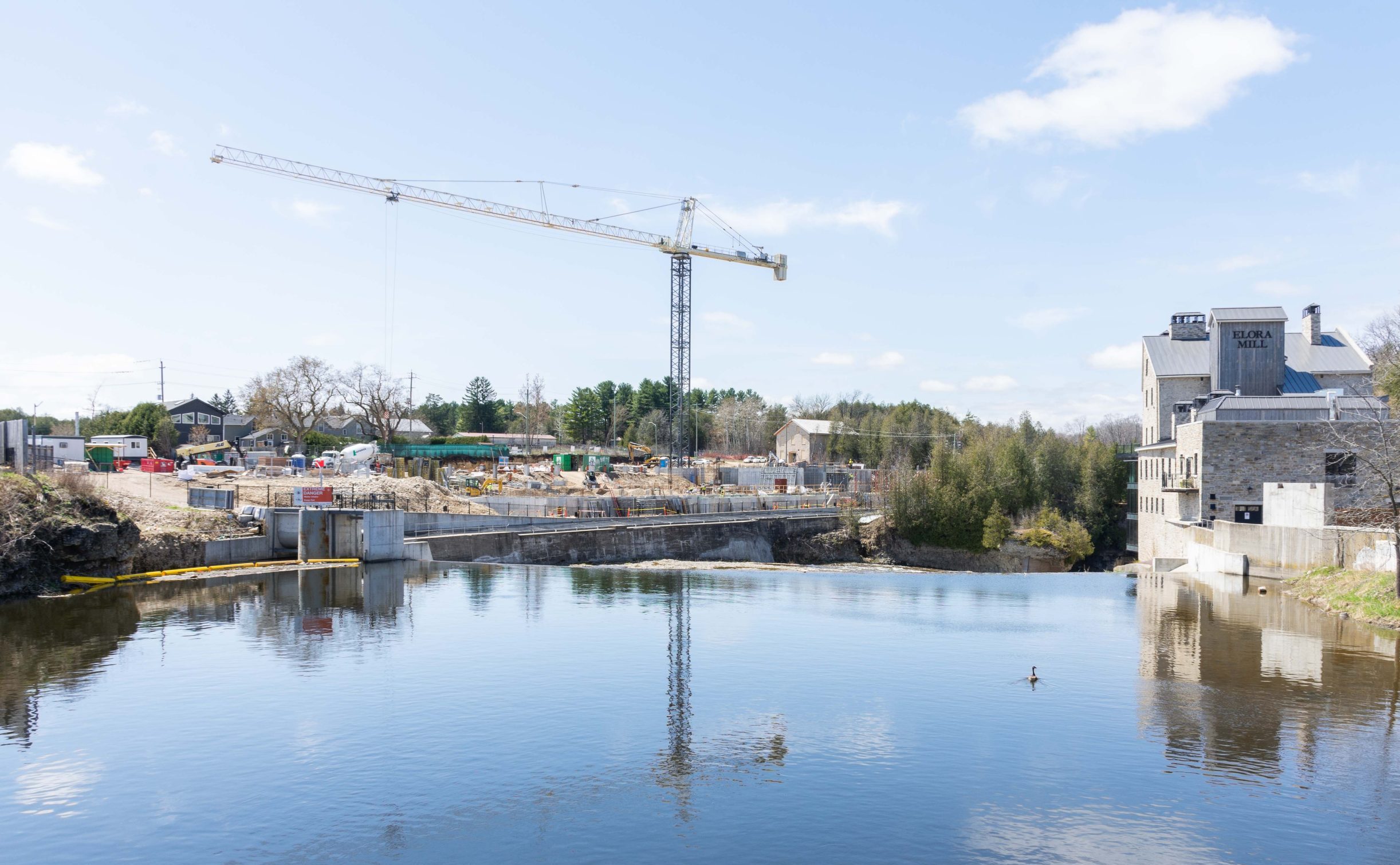GUELPH – Wellington County councillors quarrelled on May 26 over a five-year tax rebate program recommended for Pearle Hospitality by the county’s economic development committee.
Pearle Hospitality, also known as Elora South Inc., applied in July 2021 for a Tax Increment Equivalent Grant (TIEG) under Centre Wellington’s Community Improvement Plan.
Township council designated the location a “priority site” and approved a TIEG application that will see an estimated $3.81 million in tax revenue returned to Pearle in the span of a decade.
Centre Wellington then approached the county, requesting it consider such a tax rebate, but under its Invest Well Community Improvement Program.
Pearle’s proposed six-phase Elora South development – the largest Elora has ever seen – would eventually occupy 8.9 acres on the south side of the Grand River with residential, commercial and hotel buildings.
The TIEG program works by taking a portion of taxes paid in a year on that new development or improvement, and kicks the dollars back to Pearle as a rebate.
It functions as a round-about way to defer the increase in property taxes for five years that would take effect on new builds joining the tax base.
The benefit to the developer is an easing of the financial burden incurred during the early stages of commercial and industrial property development when expenses are at their highest – especially on former manufacturing sites known as “brownfields,” as is the case here.
According to a report from economic development director Crystal Ellis, the TIEG program will rebate all “incremental taxes” in the first year before dropping by 20 per cent each year through years two to five, until all taxes are collected and kept in year six, onward.
“This amounts to a total proposed [rebate] value of $931,695 over five years,” Ellis stated in her report.
Once all six phases are fully built out in 15 years, the resulting commercial and residential property taxes being paid each year would amount to an estimated $1.41 million, split between the township’s $487,868 portion and the county’s $923,723 – based on 2021 assessment values.
Addressing council, county councillor and finance committee chair Chris White characterized the program as a “slight reduction on future tax” and said long-term tax revenue far outweighs the rebate amount.
By comparison, the township received $10,874, and the county $20,588, in property taxes from two developments currently underway along Carlton Place.
But the rebate was too much for councillor Campbell Cork to accept at a time when, he said, there are residents who are already having difficulty affording taxes and paying for food.
Cork doesn’t have a problem with the development and remarked that it looked “very exciting” when he drove by it that Thursday morning.
But the Ward 3 councillor, representing Wellington North, believes any tax income is better used in the short term for those who need it most — not to help a “large corporation to build a multimillion dollar luxury development.”
To help the company, he suggested council instead provide “quick and efficient assistance, quick action on building permits and zoning changes, and elimination of red tape.”
Cork concluded: “I cannot, in good conscience, support that grant, and I will be voting against it.”
Councillor Jeff Duncan explained the rationale behind the program, describing it “simply as a bit of a break on the taxes collected” and said it provides an option to encourage economic activity, especially on brownfield sites, which are notoriously more difficult and expensive to develop.
Cork’s remarks offended councillor Doug Breen, who stood across the horseshoe and accused Cork of being “disingenuous” in his remarks.
Breen further questioned if Cork was intentionally being inflammatory or “trying to confuse the public.”
“It’s absolutely crazy to not support this,” Breen said. “This is like feeding the golden goose for a couple years until it starts laying eggs.”
Councillor Diane Ballantyne admonished Breen, who sat next to her, for “hurling” words such as “crazy” at a fellow councillor.
“I don’t think we need to be inflammatory about having different opinions about this,” she said.
Ballantyne didn’t explicitly voice support for the development, instead saying, “I’m not not supportive.”
Having a larger tax base, councillor George Bridge said, will allow the county “to do a lot more of the things that we want to do for our underprivileged and some poor people that are having trouble paying taxes.”
Councillor Mary Lloyd, whose ward the development would be in, said if it wasn’t for incentive programs like the TIEG program, brownsites could end up sitting as underutilized and undertaxed eyesores.
Business confidence and investment depend on the county following through on its commitments, councillor Andy Lennox said.
“If this brings more commercial development to our county, because we have this, everyone benefits, because it’s going to help take the tax burden off the residential taxpayer, because commercial and industrial, in particular, contribute huge dollars more than they take in community services,” Lennox said.
Warden Kelly Linton had the last word.
Pearle met all of the program’s conditions, he said, noting the company had gone through an application process, provided by the county, the same way any other business would have.
“When we say that we’re going to do something, we follow through,” Linton said.
According to Ellis’ report, county staff assessed Pearle’s application based on Invest Well guidelines, prioritizing strategic land use, rental housing, building and infrastructure improvement, economic diversification, and tourism.
Officials say the development is anticipated to make the county a “premier destination” in Canada, promote visitor spending, create new jobs, diversify the local economy and bring in additional tax revenue.
The committee’s recommendation passed with Cork the lone councillor in opposition.




